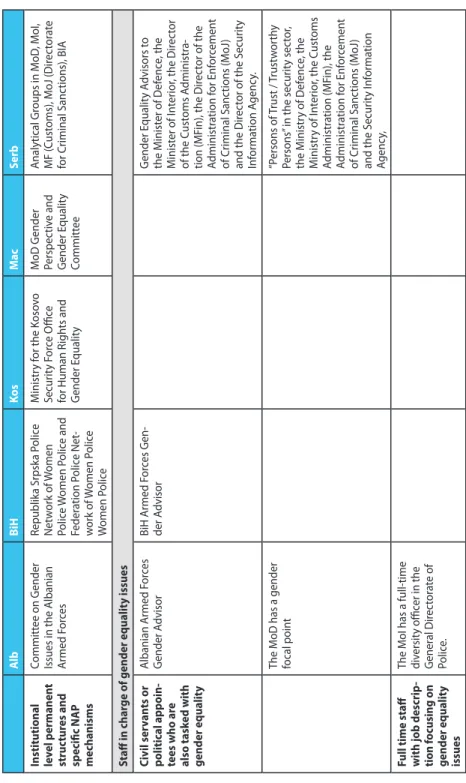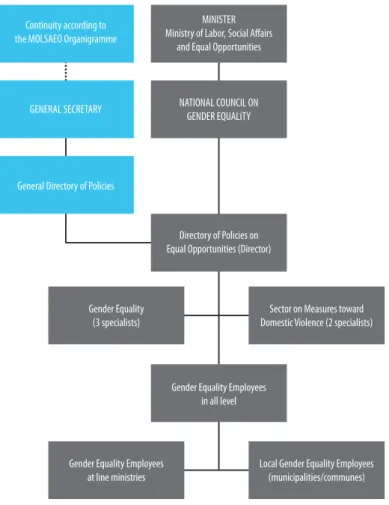This report provides an independent review of the initial phase of government-led development and implementation of national policies for the translation of UNSCR 1325 in the Western Balkans context. APs and provides an overview of the experiences from NAP/AP 1325 development and implementation in the region.
I GAPS IN DESIGN
The text starts with an overview of the national policies through which the region's governments have formally implemented UNSCR 1325 in their national contexts. Third, we analyze the actors tasked with implementing and monitoring NAPs at the national level to see which public policies have been selected as hosts for the implementation of UNSCR 1325 and how inclusive the process has been.
Which documents have been used to streamline the UNSCR 1325 agenda nationally?
This article provides a comparative study of the similarities and differences regarding the early stages of development and implementation of national policies related to the translation of UNSCR 1325 into practice in Albania, Bosnia and Herzegovina, Kosovo, Macedonia and Serbia. Fourth, due to the relatively short track record of implementing NAPs/APs, there is a broad review of implementation achievements and gaps, while the majority of evidence is presented in the national chapters.
Lessons learned/Recommendations
Increasing the role of women and their participation in decision-making in defense and security. Representation of women in traditional security institutions, e.g. A gender perspective must be adopted in the planning and implementation of peace operations and negotiations. GENDER MAINSTREAMING Gender mainstreaming in the security sector.
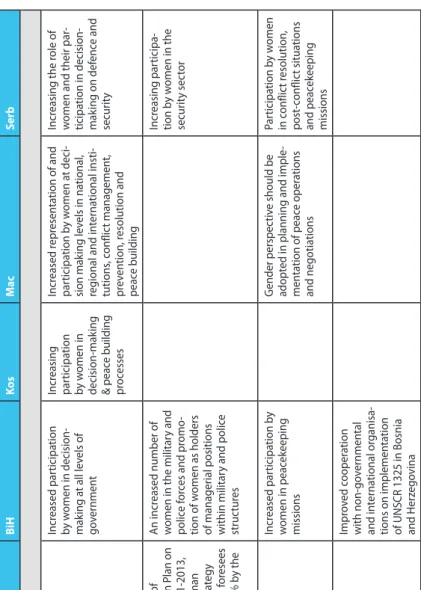
Participation
Based on our review of the key objectives of the existing NAPs, we can conclude that all documents mention the three cornerstone principles, but not all pay equal attention to them.
Who is to be protected from what?
All plans pay special attention to developing knowledge and capacity to understand GBV threats to women in the peacekeeping environment, and measures such as specialized training and sensitization of the armed forces have been designed. After a limited track record, we can conclude that most has been done in developing the capabilities of traditional security sector institutions to provide protection in the context of multinational operations.
Women as a target and/or actors of prevention
It aims at the involvement of women in conflict prevention and recovery at local level through Prevention Councils and Municipal Councils, but also in collaboration with civil society. Governments do not seek opportunities to cooperate, for example in the area of transitional justice, where most compensation for victims and access to justice depends on cross-border cooperation.
Lessons learned regarding the thematic focus of NAPs
The desired effect of prevention is mostly localized at institutional level or at national level. No NAP explicitly foresees any measures aimed at preventing the re-emergence of conflicts and other cross-border insecurities at the regional level.
Distinguish between categories of female population
Macedonia's NAP singles out ethnic Albanian women as a group that would benefit from measures aimed at ensuring better representation for the non-majority population agreed as part of the Ohrid Framework Agreement package.9 Serbia's NAP recognizes the special needs of female refugees and IDPs.10 In addition, a link is made to the larger ex-. 9 However, as Elena Anchevska shows in this publication in her study of the Macedonian NAP, the focus on gender was also reflected in the composition of the working group for NAP development.
Links to existing national strategies and international obligations
It will serve as a basis for the preparation of a political document on gender equality in the army as part of the medium-term plan of the Albanian Ministry of Defense, including relevant provisions for the implementation of UNSCR 1325. BiH Agency for Gender Equality and entity centers submit - submitted proposals for amendments to state and entity laws on police officers in accordance with the Law on Gender Equality in BiH, which is a prerequisite for greater participation of women in the police and in decision-making.
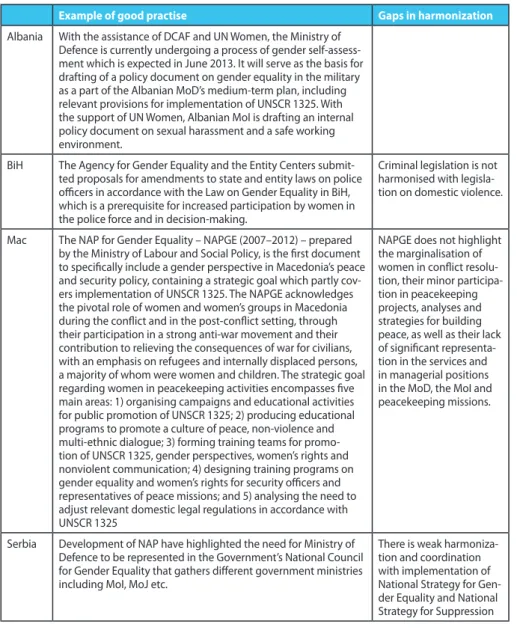
Who is who in national UNSCR 1325 implementation architecture?
The Ministry of Defense has a gender focal point “Persons of Trust / Trustworthy Persons” in the security sector, the Ministry of Defense, the Ministry of the Interior, Customs (MFin), the Administration for the Enforcement of Criminal Sanctions (MoJ) and the Security Council . Information Bureau,. Only the Ministry of Defense and the Ministry of Health have full-time gender equality staff, while the Ministry of the Interior has someone who does this job in addition to their regular work.
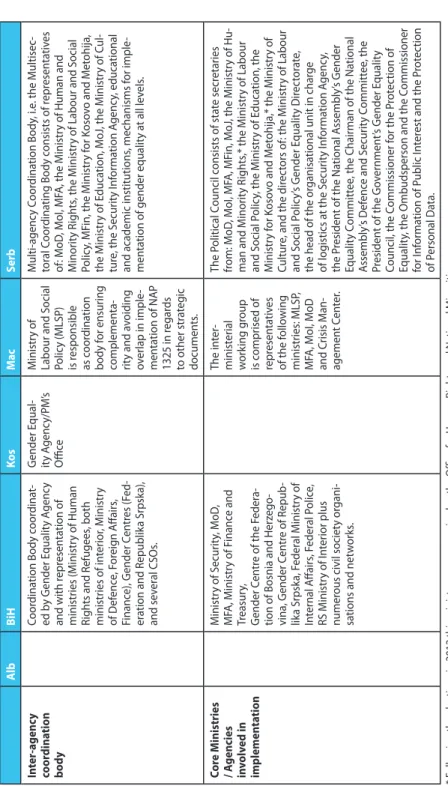
Allocation of resources for implementation of WPS agenda
Albania's National Plan for Gender Equality foresees gender focal points or gender equality workers located in relevant institutions to monitor the implementation of gender equality and to support gender integration in the policies and programs of the ministry in which they work. This was done through the approval of the Law on Financing the Implementation of the Gender Action Plan (FIGAP).
Monitoring, reporting and evaluation mechanisms
In order to develop local ownership, at least part of the funds for the implementation of the NAP should be provided by national budgets. The more complex architecture of the NAP of Serbia foresees additional bodies that monitor the implementation of the NAP at the level of the executive (Political Council) and the parliament (Supervisory Body).
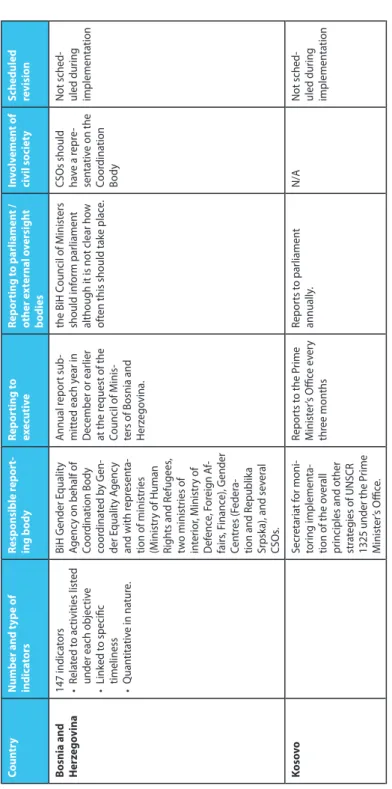
What gets measured gets implemented
States parties should report on the legal framework, policies and programs they have implemented to ensure women's human rights in conflict prevention, conflict and post-conflict situations. States parties' reports should address actions within and outside their territory in areas under their jurisdiction, in addition to their actions taken individually and as members of international organizations as they relate to women and conflict prevention, conflict and post-conflict situations.
Recommendations
Conclusion
II COUNTRY CHAPTERS
ALBANIA
Introduction
Maps the current situation for women in the Albanian security sector, highlighting key achievements as well as gaps and challenges;. Aware of the limitations of the initiative in terms of time and resources, the paper concludes by highlighting the progress made so far and identifying gaps and challenges that need to be addressed in fulfilling the obligations of UNSCR 1325, as identified in the literature and by key informants.
I Gender mainstreaming and security sector reform in Albania
This is important because gender equality plays an essential role in the democratic functioning of the security sector. The National Strategy for Gender Equality and the Fight against Domestic Violence (NSGE-DV) guides national gender equality efforts.
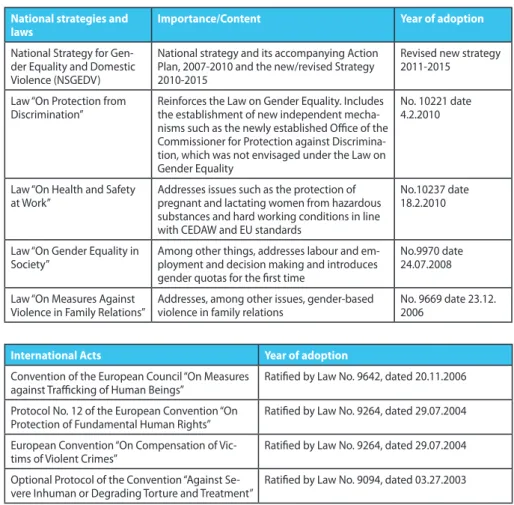
II Implementation of UNSCR 1325 in Albania
Personnel in the defense (especially peacekeeping forces) and the police sector have been trained in gender equality and UNSCR 1325;. There is a deficit in the funding needed to support equality and empowerment initiatives.
BOSNIA AND HERZEGOVINA
The findings in this report are largely based on the results of previous research and activities by the organization Women to Women and its partners in relation to the implementation of UN Security Council Resolution 1325 and the integration of gender and gender equality issues in the security sector,43 as well as on consultations and interviews with state representatives institutions and organizations of civil society participating in the implementation of AP 1325. The reports on the implementation of the AP, which the Agency for Gender Equality annually submits to the Council of Ministers44, were also used as an important source of information for this report.
I Gender mainstreaming and security sector reform in Bosnia and Herzegovina
2009 onwards
At the entity level, there are sixty such persons working in the ministries of both entities. Allegations are also made about the discriminatory and abusive treatment of women in the military.
II Action Plan for UNSCR 1325 implementation in Bosnia and Herzegovina: development and implementation
The design process for the AP was coordinated by the Gender Equality Agency, in collaboration with the Working Group for the Preparation of the AP for the Implementation of UN Security Council Resolution 1325 in Bosnia and Herzegovina. The aim is to ensure the sustainable implementation of the Gender Action Plan of Bosnia and Herzegovina.
KOSOVO
This paper deals with the implementation of Resolution 1325 of the Security Council of Kosovo in the security sector of Kosovo, especially in the Kosovo Police and the Kosovo Security Force. It describes the scope of their responsibilities in relation to Resolution 1325 of the RKSKB, as well as provides statistical data regarding the inclusion of women in the relevant institutions.
I Gender Mainstreaming and Security Sector Reform in Kosovo
77 Agency for Equality, Prime Minister's Office, Research report 'Women in the workforce and the decision-making process in Kosovo' Prishtina, 2011. Furthermore, the Women's Corps in the Kosovo Assembly makes a notable contribution to the participation of women in Kosovo.
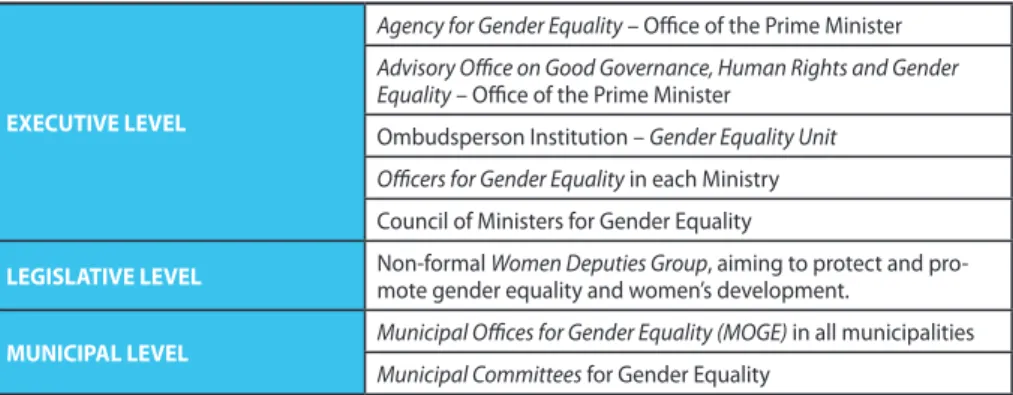
II Development of the NAP for implementation of UNSCR 1325 in Kosovo
These organizations are considered to be the most active initiators and the main advocates of women's rights and responsibilities in the implementation of UNSCR 1235. In addition, civil society, especially women's rights organizations, have introduced countless initiatives aimed at gender equality and the inclusion of women in the public sector.
MACEDONIA
Finally, it is worth noting that the development and adoption of Macedonia's NAP 1325 is not an end in itself, but rather marks the beginning of a process aimed at effecting real and meaningful change. It stands as an entry point for increased respect for women's rights and empowerment and to recognize the country's commitment to women, peace and security-related issues.
I Gender mainstreaming and security sector reform in Macedonia
The principle of gender equality has been enshrined in the Constitution of the Republic of Macedonia since its adoption in 1991 (Articles 9, 54 and 110). In March 2007, the Department for Equal Opportunities was created within the Ministry of Labor and Social Policy (MLSP) (following a restructuring of the unit formed in 1997), and it is a crucial actor in the implementation of the law.
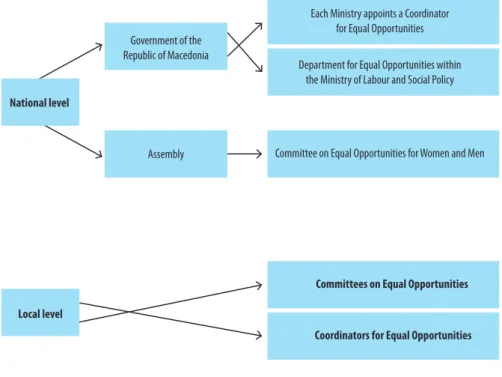
II Development of the NAP for implementation of UNSCR 1325 in Macedonia
One of the main achievements identified in terms of good practice is the transparent and inclusive nature of the development process of NAP 1325. This gender focus is also reflected in the composition of the working group responsible for the preparation of the DNR.
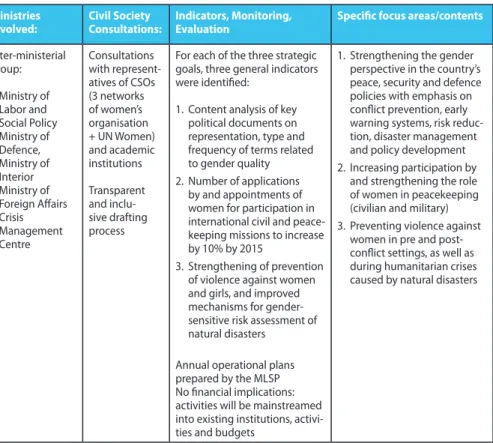
SERBIA
At this stage, there is no common set of indicators for monitoring and reporting on NAP 1325 implementation. This study is based on desk research and the results of BCSP's monitoring of NAP 1325 implementation in Serbia since 2011.
I Gender mainstreaming and security sector reform in Serbia
The first results of SSR were changes in the organizational structure of the police,101 allowing it to be depoliticized and professionalized, and allowing democratic civilian control of the armed forces to be implemented.102 However, it was not until 2009 that the process of designing the basic legal framework – the constitutional norms, basic laws and institutions to place the security sector under democratic civilian control – was finally completed, marking the end of the first generation SSR103 in Serbia. 106 Gender equality mechanisms at local level, gender equality mechanisms in the security sector as provided for in NAP 1325, etc.
II Development of the NAP for implementation of UNSCR 1325 in Serbia
Positive steps have been taken in educating and raising awareness among security sector personnel about the importance of gender equality. There are still no common indicators for monitoring and reporting on the implementation of the NAP.
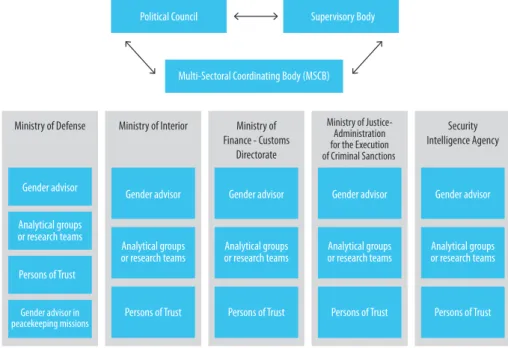
Sources
Albania
Directory of policies for equal opportunities and the family website Gender Equality Agenda for Rural Development website.
Kosovo
Gender and Security: Mapping Security Sector Actors in Kosovo and Gender-Related Policies, Practices and Strategies Prishtina, 2010. Gender and Security: Mapping Security Sector Actors in Kosovo and Gender-Related Policies, Practices and Strategies http://saynotoviolence.org / join-say-no/.
Macedonia
Lidija Georgieva, Faculty of Philosophy – Institute for Security, Defense and Peace Studies Ljubica Pop-Taleska, Ministry of Defence. Savka Todorovska, National Council of Women of the Republic of Macedonia Gjuner Nebiu, Women's Civic Initiative "Antico".
Serbia
United Nations Security Council Resolution 1325 in Serbia – On Women, Peace and Security, Recommendations for the Preparation of the National Action Plan for the Implementation of UN SC Resolution 1325 in Serbia, Belgrade: Belgrade Fund for Political Excellence. State of the political institutions in Serbia and their impact on the creation and management of public policies).
About the Research Team
Sonja STOJANOVIĆ GAJIĆ is Director of the Belgrade Center for Security Policy, an independent security think tank that is among the top 20 think tanks in Central and Eastern Europe and among the top 70 think tanks in the field of Security and International Affairs. She is editor-in-chief of the handbook: Women and Women's Activism in Bosnia and Herzegovina, To Be Peace – the local concept for Peace Building, and co-editor of the handbook Fasilitacija (Fasilitation).
Annexes
Overview of regional initiatives and events on gender and security in the Western Balkans
- Regional conference: Ohrid Initiative - Strengthening the “1325 Community” in the Region Ohrid, Macedonia,
- Regional conference: THE REGIONAL DIALOGUE ON GENDER AND SECURITY: Uniting Government’s and CSOs Efforts in Implementation of the UNSCR 1325 Agenda
- Regional conference: What is the gender of security?
- Regional conference: UNSCR 1325 Goals- Degree of Feasibility Skopje, Macedonia,
- Conference: Gender Issues in the Security Sector Skopje, Macedonia,
- Cetinje parliamentary forum: Women, peace security-two years later Cetinje, Montene-
- Conference: UNSCR 1325: Moving beyond Theory to Maximize Security in the OSCE in Sara- jevo, Bosnia and Herzegovina
- Forum: Gender Mainstreaming in state institutions and ESDP missions-equal opportunity for gender equality
- International conference: Peace and Security- Gender Alternatives Skopje, Macedonia,
- International conference: Women in the security sector - Resolution 1325 SBUN Podgorica, Monte-
Providing a platform for the exchange of experience on police services in the SEE region 2. Designing manuals for police managers at all levels Gender Equality in the Military http://www.seesac.org/project.php?l1=135&l2= 150 SEESAC under the mandate given to it by.

